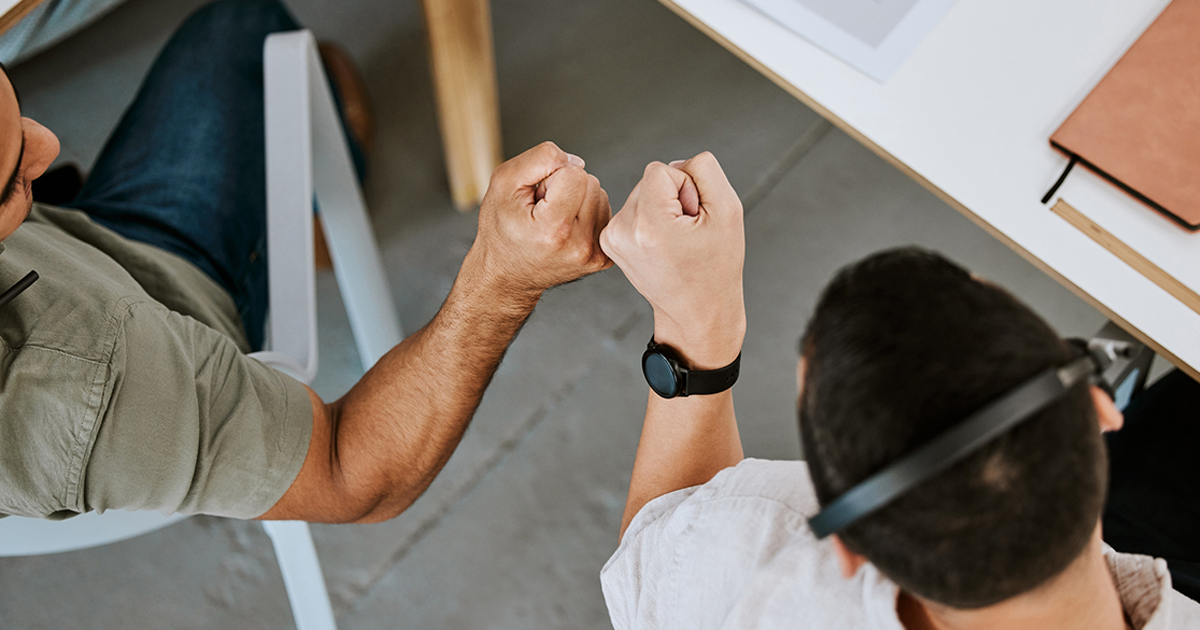Some days get the best of us. The train is late. There’s a pop quiz in class. Your boss is disappointed. The list goes on and on. It can be hard to feel happy when it seems like there are so many factors working against us.
The good news? There’s an easy way to boost your mood that’s completely within your control. And, plot twist, it involves boosting someone else’s first.
We all have an anecdote about how being nice to someone made us feel good. Now, science is beginning to help us understand why.
Using brain imaging, researchers found that receiving money increases activity in the brain’s reward system. The same area of the brain that releases feel-good chemicals when stimulated by food or sex. But that’s not all. Donating to a charity also had the same effect. In other words, both giving and receiving kindness can produce a natural high.
I know what you’re thinking: “If you have money to donate, of course donating money feels good!” But here’s the thing, you don’t have to spend money to reap the benefits of being nice.
Take this British study for example. These researchers found that when people aged 18 to 60 carried out random acts of kindness every day for 10 days, they reported higher life satisfaction than those who didn’t. Kindness: It’s a win-win.

Achieve your mental wellness goals
AbleTo programs give you 24/7 access to tools, activities, and content tailored to your needs. Sign up or log in to start exploring.

Share the love
In the spirit of kindness, here are 7 simple ways to spread joy and, in turn, feel that joy yourself.
Tell someone they’re doing a great job
From leaving a thank you note for your mail carrier to writing a Yelp review about a great waiter, noticing the work someone is putting in and saying thank you can make a huge difference in their day.
Let someone else go first
Slowing down often opens up opportunities to be kind. Maybe it’s letting a car merge in front of you in traffic. Or, letting a person with fewer items at the grocery store check out before you. There are countless ways being a little patient can make all the difference to someone else.
Give something other than money
What do you own that you can give away? Consider carrying items like granola bars or new socks that you can give to unhoused folks. Or, pack up used amenities that are still in good condition, like towels and sheets. Many animal shelters accept old linens to keep their animals warm.
Pay someone a compliment
It’s human nature to think that when someone is looking at you, they’re judging you. Flip this perception on its head. The next time you’re loving a stranger’s style, let them know.
Do someone else’s chores
Whether it’s a roommate, family member, or colleague, everyone gets overwhelmed. Sometimes just doing something small, like the dishes, when it’s not your turn can help someone else catch their breath.
Offer up your time
Everyone needs a break sometimes. If you know someone with kids or pets, offering to babysit or pet sit for free can be a huge help. Or you can get creative with how you offer up your donated time. Help someone clean out their closet, weed their garden, or even move house.
Get in touch
Lots of people touch our lives without ever really knowing their impact. If there’s an old teacher, coach, or friend that changed your life, send them a message of gratitude. It could be exactly what they need that day.
Kindness breeds kindness
At the end of the day, you don’t need a lot of money or a lot of time to show kindness. Sometimes, it can be as simple as making eye contact, saying hi, or just offering a smile.
If someone doesn’t wave back or express gratitude, that’s ok. Move on to the next opportunity. Kindness has a ripple effect. If you keep expressing it, it will keep coming back to you.
Need help putting these tips into practice?
You may be eligible for virtual therapy, coaching, or on-demand self care from AbleTo. Each program is designed by clinicians and grounded in science. Sign up today and get the support you deserve.
By Giselle Alexander, LCSW, AbleTo Program Advisor
Giselle Alexander is a licensed clinical social worker with over 15 years of providing culturally appropriate psychotherapy and social services to individuals and families. She received her clinical license to provide psychotherapy in 2010. Her training and experience come from a varied background of working in community mental health, social services, and private practice with individuals and families grappling with severe and persistent mental illness, anxiety, depression, grave disability, and end of life transitions. When she’s not connecting with her clients, she enjoys the outdoors, dancing, cooking, and spending time with her family and her rescue dog, Maggie.
Clinically reviewed by Sarah Dolling, LPC, Clinical Content Producer at AbleTo.
Photo by PeopleImages/iStock. Individuals in photographs do not represent AbleTo participants.
The information featured on this site is general in nature. The site provides health information designed to complement your personal health management. It does not provide medical advice or health services and is not meant to replace professional advice or imply coverage of specific clinical services or products. The inclusion of links to other websites does not imply any endorsement of the material on such websites.


